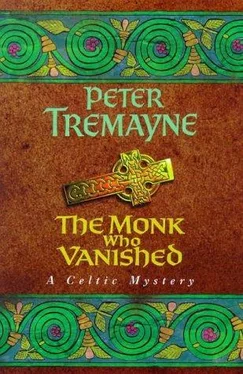Peter Tremayne - The Monk Who Vanished
Здесь есть возможность читать онлайн «Peter Tremayne - The Monk Who Vanished» весь текст электронной книги совершенно бесплатно (целиком полную версию без сокращений). В некоторых случаях можно слушать аудио, скачать через торрент в формате fb2 и присутствует краткое содержание. Жанр: Исторический детектив, на английском языке. Описание произведения, (предисловие) а так же отзывы посетителей доступны на портале библиотеки ЛибКат.
- Название:The Monk Who Vanished
- Автор:
- Жанр:
- Год:неизвестен
- ISBN:нет данных
- Рейтинг книги:3 / 5. Голосов: 1
-
Избранное:Добавить в избранное
- Отзывы:
-
Ваша оценка:
- 60
- 1
- 2
- 3
- 4
- 5
The Monk Who Vanished: краткое содержание, описание и аннотация
Предлагаем к чтению аннотацию, описание, краткое содержание или предисловие (зависит от того, что написал сам автор книги «The Monk Who Vanished»). Если вы не нашли необходимую информацию о книге — напишите в комментариях, мы постараемся отыскать её.
The Monk Who Vanished — читать онлайн бесплатно полную книгу (весь текст) целиком
Ниже представлен текст книги, разбитый по страницам. Система сохранения места последней прочитанной страницы, позволяет с удобством читать онлайн бесплатно книгу «The Monk Who Vanished», без необходимости каждый раз заново искать на чём Вы остановились. Поставьте закладку, и сможете в любой момент перейти на страницу, на которой закончили чтение.
Интервал:
Закладка:
Fidelma grinned. ‘The fox never found a better messenger than myself,’ she replied.
Eadulf groaned in impatience at another of Fidelma’s axioms.
‘Don’t you have another proverb in this land — do not show your teeth until you can bite?’ he demanded sarcastically.
Fidelma chuckled. ‘Well said, Eadulf. You are learning. But tonight at dusk we shall be at the Well at Gurteen.’
Chapter Eleven
Dusk was approaching when Fidelma and Eadulf left the abbey. Making sure that they were not observed, they began to follow the directions that Samradan’s driver had given them to the Well of Gurteen. As the day had been warm and the approaching night was clearly going to be cold, there was a faint ground mist already beginning to rise from the fields around them. There was no movement for there was no wind, not even an evening breeze to rustle the trees or bushes.
They had decided to walk from the abbey rather than ride for Fidelma believed it would draw less attention to their excursion. Eadulf had brought a stout staff with him, a discarded pilgrim’s staff which he had found in the abbey. It was wise to have some means of protection when being late abroad. At night wolf packs roamed the countryside and it was not unknown for them to attack lonely wayfarers. In some areas they were so numerous, dwelling in the woods and fastness that, if pressed by hunger, they could present a formidable danger to whole communities let alone those who dwelt on the isolated farmsteads.
Even as they walked along the track, a lonely howl rent the air not too far away. Eadulf clenched his staff more tightly and glanced quickly in the direction of the wailing, siren-like sound.
‘Now I understand why the Irish word for a collection of wolves is glademain,’ he observed, his eyes anxious. The word was derived from glaid meaning ‘cry’; hence, a cry of wolves.
‘They have a strange, bewitching call,’ Fidelma admitted. ‘Sometimes people have been so beguiled by it as to forget the dangers. They are the only really dangerous animal in the country. Many of the nobles have annual hunts to keep down their numbers.’
A dog began to bark in answer to the howling of the wolf.
‘Now that’s another danger,’ Fidelma observed. ‘It is custom and law that watch-dogs on farms are tied up early in the morning but set free at cow-stalling to protect the farmsteads. Sometimes they can be just as vicious in their attack as that “son of the country” you hear calling.’
Eadulf was about to say something when the eerie call of the wolf came again. He waited until the cry died away.
‘I have heard a wolf called many things but “son of the country” — why that?’ He shivered slightly.
‘I can think of four names for the animal as well as the collective name. To call it mac-tíre, “son of the country”, is just an allusion to the fact that it haunts the wild woods and fastnesses.’
She suddenly halted and gestured for him to also stand still.
‘Up ahead,’ she said quietly. ‘There is the tilled field which I think Samradán’s driver alluded to. The well must be nearby.’
The twilight, coupled with the ground mist, had not yet obscured the field. In fact, the mist had not risen more than a few feet. It swirled around their lower legs as if they were wading through white, shallow water. Eadulf followed the direction of her outstretched arm and saw in the gloom a rectangular enclosure which was clearly outlined by surrounding trees.
‘That must be it,’ he agreed, pointing to a corner where he could just make out a large, curving bough. It was obviously man-hewn, and rose from the misty ground to a height of nine feet or more. At the end of this they could see a rope from which a wooden bucket was suspended.
Fidelma led the way again, climbing on the low stone wall into the field and proceeding across the damp, ploughed soil towards the well.
‘No one seems to be here yet,’ grunted Eadulf as he looked about him in the semi-gloom.
Almost as he spoke there was a movement on the other side of the small stone wall which surrounded the well head; it was a wall made of piled boulders of varying sizes placed there without mortar.
‘Who’s there?’ demanded Fidelma.
There was a wheezy cough and the voice of Samradán’s driver greeted them.
They moved around the well head and found the man seated with his back to the low wall. His legs were placed straight out in front of him and his arms were loose at his side. They could not discern his features in the shadows.
‘I … I was hoping that you would come soon,’ the man said, raising his head to them.
Fidelma gazed down at him with a frown. ‘Is there something the matter?’ she asked, wondering why he did not rise.
‘I have not long,’ the man broke in impatiently. ‘Do not speak but listen to what I say.’
Fidelma and Eadulf exchanged a glance expressing their perplexity.
Nearby came the plaintive wail of a wolf once more. This time it was joined by several others so that the sounds seemed to rise all around them.
‘Speak, then,’ Fidelma invited, seating herself on top of the small wall. ‘What do you want with us?’
Eadulf continued to stand, his hands on his staff, gazing anxiously into the growing dusk. ‘A fine place to set for a meeting,’ he muttered. ‘Wouldn’t it be better to leave here and seek some more protective spot?’
The man still had not risen and he ignored Eadulf. ‘Sister Fidelma
… I am of Cashel. Let that suffice, for my name will mean nothing to you. Cred did not tell you the whole truth.’
‘I don’t doubt it,’ Fidelma greeted the statement in even tones. ‘We all shape truth to fit our perception of it.’
‘She lied in what she admitted to you,’ the driver insisted. ‘I saw the man she calls the archer meet with other people at the tavern. She knew it and lied.’
‘Why would she do that?’ ‘Listen to me first. The archer met with a Brother of the faith. I saw this Brother enter the inn. He did so when Cred was in the inn. She did not think that I observed him for I was taking a nap by the fire after my meal. The archer’s entry had disturbed me and I was about to bestir myself when I saw the religieux enter. He was nervous so I decided to pretend that I was still asleep and watched from under lowered lids.’
‘Who was he? Did you recognise the man?’
‘No. But I felt it strange for a religieux to have entered a tavern the like of which Cred ran, if you know what I mean.’
‘So you saw a religieux enter. Was he a rotund, moon-faced Brother?’ asked Fidlelma.
The driver nodded.
‘With greying, curly hair which had once been cut into the tonsure of Rome?’ added Eadulf. ‘A tonsure like mine?’
‘No,’ the man shook his head. ‘He wore the tonsure of an Irish brother. What you call the tonsure of St John. But he was, as you say, a rotund, moon-faced brother.’
‘When was this?’
‘Less than a week ago. I cannot be precise.’
‘Did you see the monk leave the inn?’
‘Some time later. I had gone to the blacksmith’s by then. One of the wagons had a broken axle and the smith was mending it. While I was there I saw the very same Brother hurrying by towards the abbey.’
‘Brother Mochta?’ queried Eadulf, more to Fidelma than to the driver.
‘The name means nothing to me,’ the man insisted.
‘How do you know that he met with the archer? He could have been visiting someone else in the tavern.’
‘Apart from myself and the other two drivers, only the archer was staying at the tavern. When the Brother came in, he said something to Cred who replied, “He is waiting for you above the stair”. Who else could be waiting for him but the archer?’
Читать дальшеИнтервал:
Закладка:
Похожие книги на «The Monk Who Vanished»
Представляем Вашему вниманию похожие книги на «The Monk Who Vanished» списком для выбора. Мы отобрали схожую по названию и смыслу литературу в надежде предоставить читателям больше вариантов отыскать новые, интересные, ещё непрочитанные произведения.
Обсуждение, отзывы о книге «The Monk Who Vanished» и просто собственные мнения читателей. Оставьте ваши комментарии, напишите, что Вы думаете о произведении, его смысле или главных героях. Укажите что конкретно понравилось, а что нет, и почему Вы так считаете.












